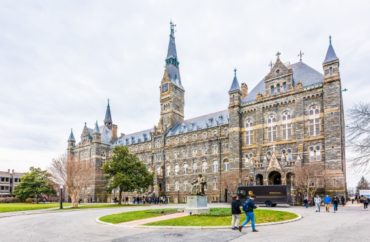
‘Ongoing investigation’ regardless of what university claims
Following an October report by the U.S. Department of Education that questioned Georgetown University’s financial ties to foreign governments and reporting of contributions from overseas donors, the school claimed the department had told them it “anticipated closing the matter” and “will not be conducting further investigations.”
Further, a Georgetown spokesperson told a campus reporter in November the Education Department report contained “mischaracterizations, inaccuracies and misunderstandings.”
Not so fast, says the department.
In an email Monday to The College Fix, a spokesperson for the Education Department declined to comment on the school’s specific claims, but characterized its probe into Georgetown and other schools as an “ongoing investigation.”
The spokesperson said the department “will allow the report to speak for itself,” adding, “the Department stands by it.”
Representatives for Georgetown declined requests by The College Fix to comment for this story.
According to the report, the Education Department found $6.5 billion in previously unreported foreign money flowing to U.S. colleges and universities.
“The threat of improper foreign influence in higher education is real,” said Education Secretary Betsy DeVos* in a statement following release of the report.
“Transparency in foreign funding of higher education is not just something I think is a good thing; it’s the law,” DeVos said. “For too long, enforcement of that law was lax, but not anymore.”
According to the Higher Education Act of 1965, institutes of higher education are required to report, twice per year, any foreign gifts in excess of $250,000.
The report did not provide specific amounts of unreported foreign contributions for individual schools. But according to an Education Department database, Georgetown has reported $380 million in gifts and contracts from foreign governments since 2014.
But the report also criticizes other financial arrangements schools enter into with foreign governments, suggesting that they may be a security risk.
For instance, in 2008, Saudi Arabian Prince Alwaleed Bin Talal provided Georgetown with a $20 million gift to fund the Center for Muslim Christian Understanding, which sought to “promote Islamic civilization’s image in the United States,” to “disseminate findings through scholarship,” and to hold academic events.
The center was immediately controversial. Shortly after the gift, then-Congressman Frank Wolf (R-Va.) wrote a letter to Georgetown’s president, Dr. John DeGioia, questioning the center’s ability to “[maintain] the impartiality and integrity of scholarship that befits so distinguished a university as Georgetown” after accepting Alwaleed’s money.
Wolf further questioned the school’s entanglement with Saudi Arabia given the country’s record on human rights, women’s rights, and religious freedom, noting “the inconsistency of its policies with U.S. priorities and values.”
Others noted the danger in having a center dedicated to advancing the Saudi Arabian narrative in a school like Georgetown, which provides so many graduates to the federal government, given its location in Washington, D.C. Further, the center also faced accusations that its title was a misnomer — that there was no Christian representation anywhere in the curriculum.
“Prince Alwaleed’s agreement with Georgetown exemplifies how foreign money can advance a particular country’s worldview within U.S. academic institutions — influence that has often remained undisclosed to American taxpayers,” reads the Department of Education report.
“Georgetown retains control over the work funded by the Alwaleed gift and runs the Center without outside interference of any kind,” a university spokesperson told the campus paper in November.
The October report also questioned a $10 million contribution to Georgetown from the Hong Kong-based multinational conglomerate Spring Breeze Foundation to establish an “Initiative for U.S.-China Dialogue on Global Issues.”
According to the initial agreement, the contribution was to be doled out $1 million per year for ten years. An online database of foreign donations shows that five contributions totaling $3 million have been made from the Spring Breeze Foundation to Georgetown beginning in June of 2016. An additional unclassified contribution of $1 million from a Hong Kong-based donor was made to Georgetown in June 2020.
Spring Breeze is a subsidiary of the Thailand-based CP Group, a telecommunications, retail, finance and pharmaceuticals company that boasts multi-billion dollar contracts with the Chinese government. The Education Department report notes the gift also “involves cooperation with Tsinghua University, a top-ranked Chinese university with ties to the Chinese military.”
The report also questions schools that establish branch campuses in Dohar, Qatar, with the aid of the Qatar Foundation, a nonprofit organization funded in part by the Qatari government. According to the department, the Qatar Foundation “has been known to silence viewpoints Qatar opposes.”
While the report redacts the names of the schools partnering with the Qatar Foundation, Georgetown is among the schools that operates a branch campus in Dohar.
“All of Georgetown University’s international teaching, research, and service and outreach programs adhere to core institutional values of academic excellence, institutional autonomy, academic freedom, and service to the common good,” the Georgetown spokesperson said in November.
MORE: Department of Ed finds $6.5B in unreported foreign donations to U.S. colleges
IMAGE: Anthony Blotkin / Shutterstock.com
Like The College Fix on Facebook / Follow us on Twitter





Please join the conversation about our stories on Facebook, Twitter, Instagram, Reddit, MeWe, Rumble, Gab, Minds and Gettr.